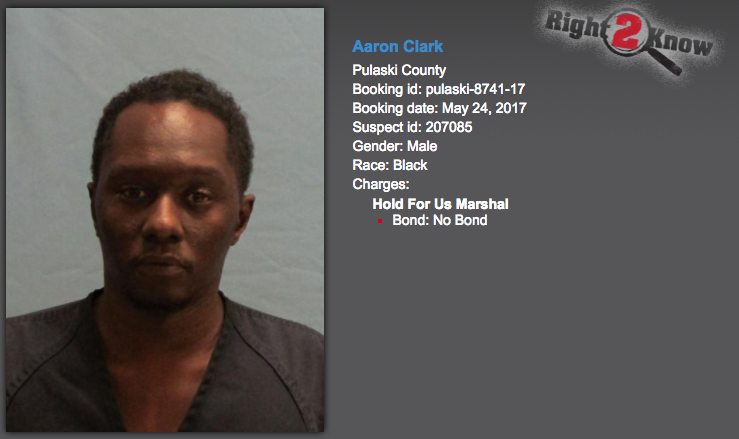A Little Rock man accused of being a large-scale distributor of numerous drugs -- including heroin, cocaine and methamphetamine -- was ordered Wednesday to remain behind bars until trial after a federal judge determined he was too dangerous to turn loose.
Aaron Laray Clark, 33, who goes by the nickname "Black," was one of 61 people named in eight federal indictments unsealed May 24, the day law enforcement officers rounded up about half the accused in early morning raids in Little Rock and North Little Rock.
Clark, who was described as the suspected leader of conspiracies to sell both heroin and cocaine, was among those arrested that morning, after officers armed with warrants surrounded his house at 207 Cherrybark Drive in the Woodcreek neighborhood about 4 a.m.
An FBI agent testified Wednesday that inside the house, which is owned by the parents of Clark's fiancee, Amber Lee Williams, officers found about $50,000 stashed behind the water heater.
Meanwhile, inside a small duplex apartment on David O'Dodd Road off Interstate 430, which the agent said was Clark's suspected "stash pad," officers found two vacuum-sealed containers labeled ICE, each of which was later determined to contain 850 grams (1.9 pounds) of methamphetamine, the agent said. He said that inside the stash house officers also found a hydraulic press, which is commonly used by heroin dealers after they have added another substance to the drug to extend its volume, and 4 kilograms (8.8 pounds) of a substance commonly used to cut heroin.
The apartment was leased by Clark's fiancee, the agent noted.
Months before Clark's arrest on seven charges and the searches at those two residences, agents had executed a search warrant in November at a house where Clark lived in the Point West subdivision off Kanis Road, agent John Sablatura testified. He said officers seized more than $100,000 in cash and jewelry, 170 grams (6 ounces) of heroin, a marijuana growing operation and six guns, but didn't arrest Clark at that time because "we were not ready to indict."
Sablatura told U.S. Magistrate Judge Jerome Kearney that agents knew, based on listening to wiretapped telephone calls between Clark and his supplier, that he was "running low" on heroin, but they decided to execute the search warrant anyway at that time, because the wiretap authorization was about to expire.
After the search warrant, Clark remained free and task-force officers continued to monitor him, Sablatura said. He testified that officers had Clark under surveillance while he continued to sell heroin, and learned that he was also selling a mixture of fentanyl and cocaine as heroin, "which many individuals overdosed on and nearly died from."
Fentanyl is an extremely potent synthetic opioid that has been linked to deaths across the country.
Sablatura, the case agent, told defense attorney Danny Glover of Wynne that agents couldn't keep Clark under surveillance at all times, however, citing in particular the difficulty of watching him at the David O'Dodd duplex, because of its location on a dead-end road.
"Mr. Clark is extremely surveillance-conscious," the agent testified, calling him "one of the most surveillance-conscious people I've seen."
Under questioning by Glover, Sablatura testified that Clark showed up on the FBI's "radar screen" last August. He is accused of leading the drug conspiracies between December 2015 and May.
The FBI agent revealed that another defendant in the case, Hector Soto of El Paso, Texas, a fugitive who is believed to be part of Clark's drug trafficking network, was seen in Clark's Honda crossing the border into Mexico, where he is believed to be hiding from authorities.
Glover, noting that Clark has a long history of making his court appearances, even for traffic tickets, asked Kearney to release Clark to the supervision of his sister, Louisa Hall of Searcy. He said showing up to court and the fact that Clark didn't run after the search at the Point West house in November, shows he isn't a flight risk.
But Assistant U.S. Attorney Benecia Moore told Kearney that Hall lives with her boyfriend, who has a misdemeanor conviction for third-degree battery, which was reduced from a felony charge of second-degree battery. The man also has an order of protection against him by the victim, Moore said. In addition, she argued that Hall owns a car that agents saw Clark using during drug deals, and that Clark has a federal court conviction from Texas for possessing with the intent to distribute cocaine.
After Clark served a nine-year federal prison sentence on the cocaine conviction, "It's clear he got right back into distributing narcotics," Moore said.
Noting all the cash, narcotics and guns found in searches of places associated with Clark, Moore pointedly told the judge, "This isn't to suggest that the FBI found all of it."
Glover asked Kearney to release Clark under conditions that would protect the community, such as electronic monitoring to ensure he stays at the house or prohibiting him from using a cellphone.
Noting that the case has numerous defendants and charges that could take years to prosecute, he said, "I hate to see Mr. Clark sit in jail for a couple of years."
Kearney cited the apparent strength of the government's case against Clark, his history of crime starting at age 17 and continuing after his release from prison, and the allegations of continued drug trafficking even after the November search, as reasons to consider him a danger to the community.
Metro on 07/20/2017

